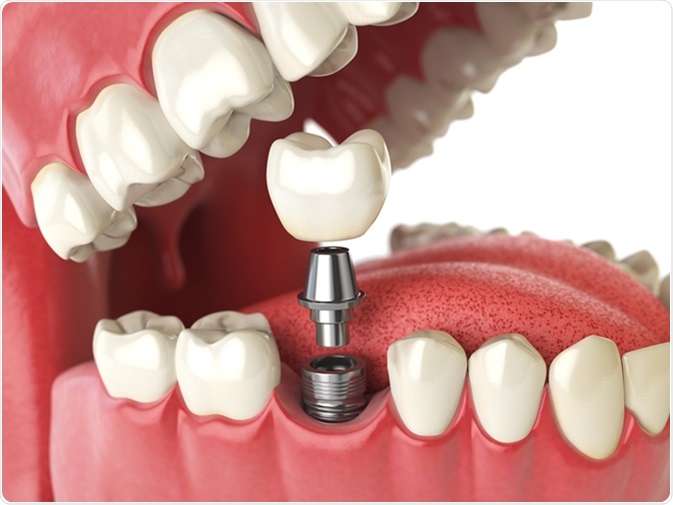Dental Implants in Chicago, IL
Missing teeth? Restore Your Smile with Dental Implants!
Learn about our Dental Implants Special here – $500 off!

Welcome to Kimberly Smiles Cosmetic & General Dentistry, your trusted destination for superior dental implants in Chicago, Illinois. We’re passionate about providing the very best dental care and enabling our patients to make informed decisions about their oral health.
What Are Dental Implants?
Dental implants are the leading solution in the realm of restorative dentistry, offering a permanent and natural-looking way to restore your smile. They consist of a biocompatible titanium post implanted into the jawbone, and a custom-made dental crown that replicates your natural tooth. Together, these components create a strong, durable, and aesthetic replacement for your lost tooth.
Benefits of Dental Implants
Choosing dental implants offers several advantages:
- Natural look and feel: Dental implants are designed to mimic your natural teeth in terms of appearance and functionality.
- Durability: Dental implants are long-lasting with proper care and regular dental check-ups.
- Preservation of bone structure: Dental implants help in preventing bone loss in the jaw that typically follows tooth loss.
- Improved oral health: Unlike other restorations, dental implants don’t require altering the structure of adjacent teeth, preserving your overall oral health.

Ideal Candidates for Dental Implants
While almost anyone can get dental implants, patients fitting the below profile will have the best outcomes when getting implants in Chicago.
- Healthy Oral Environment: The best candidates have good oral health. This means no active gum disease or untreated tooth decay. Healthy gums are essential as they will be the foundation for the implant.
- Adequate Bone Density: For an implant to be secure, the jawbone needs to be thick and dense enough to hold the implant in place. If bone loss has occurred, bone grafting might be necessary before implants can be considered.
- Good Overall Health: Dental implant surgery is a minor procedure but requires the body’s healing capabilities to be at its best. A strong immune system and good overall health can facilitate faster recovery.
- Commitment to Oral Hygiene: Candidates should be dedicated to maintaining their oral hygiene. Daily brushing, flossing, and regular dental check-ups are crucial to ensure the longevity of the implant.
- Non-Smokers or Willing to Quit: Smoking can hinder the healing process after implant surgery and increase the risk of complications. Those willing to quit, at least temporarily during the recovery phase, make better candidates.
Contraindications: Cases When Dental Implants Might Not Be Suitable
While dental implants have a high success rate and can be an excellent solution for many, there are specific conditions and situations where they might not be recommended:
- Active Infections: Patients with active infections, especially in the mouth or jaw area, should resolve these before considering implants.
- Certain Medical Conditions: Individuals with conditions like uncontrolled diabetes, hemophilia, or immune deficiencies might experience complications. It’s important to discuss any medical history with your dentist.
- Young Patients: Dental implants are typically not recommended for younger patients whose jawbones have not fully developed.
- Pregnancy: While dental implants have not been shown to directly harm expectant mothers or their unborn babies, due to the surgical nature and potential stress related to the procedure, many dentists recommend waiting until after childbirth.
- Heavy Smokers: Smoking greatly affects the healing process and can reduce the success rate of dental implants. Heavy smokers, unless willing to quit, might not be ideal candidates.
- Certain Medications: Some medications, including certain anti-resorptive drugs used to treat osteoporosis, can impact the success of dental implants. Always provide a full medication list to your dentist during the consultation.
Consultation is Key
Every patient is unique, and while the above guidelines provide a general overview, the only way to know for sure if you’re a good candidate for dental implants is through a comprehensive consultation with our dental implant specialist, Dr. Anast.
When Should You Consider Dental Implants?
You should consider dental implants if you have one or more missing teeth, or if you’re unhappy with your current restorative solution, such as dentures or bridges. Dental implants are also an excellent solution if you’re seeking a more permanent and low-maintenance option.
The Dental Implant Process and Timeline
Choosing Chicago dental implants is a significant decision and it’s important to be informed that they are not a quick fix. While patients may be eager to restore their smiles in a day with the promise of 1 day full mouth dental implants, we find it essential to manage expectations. One of the most frequent questions patients ask is, “How long for dental implants to heal?” so we thought we would put together a timeline to give you a general idea of what to expect. The entire dental implant process, from consultation to complete healing, can vary based on individual factors. However, to provide a clearer picture, here’s a step-by-step breakdown of the process and general timeline.
1. Consultation and Evaluation
- Duration: 1-2 hours
- Description: This initial visit involves a thorough dental examination, including X-rays and sometimes a CT scan, to evaluate the condition of your jawbone and surrounding structures. The dentist will discuss your medical history, evaluate the need for any preliminary procedures, and draft a treatment plan.
2. Preliminary Procedures (if required)
- Duration: Varies (can range from a few weeks to several months for complete healing)
- Description: Some patients may require preparatory procedures such as tooth extractions, bone grafts, or treatment for gum disease. The healing time for these procedures can extend the overall timeline.
3. Implant Placement
- Duration: 1-3 hours per implant
- Description: During this surgical procedure, the dental implant, a titanium post, is precisely placed into the jawbone. This post will serve as a substitute for the tooth root. While your implants are healing, Dr. Anast will place a temporary crown to keep your smile looking good. This is often where the misconception of 1 day full mouth dental implants comes into play.
4. Osseointegration (Bone Healing)
- Duration: 3-6 months
- Description: This is the phase where the magic truly happens. The jawbone grows around the implanted metal post, anchoring it securely in place. The length of this phase answers the commonly asked question of “how long for dental implants to heal.” It’s crucial to allow ample time for proper osseointegration to ensure the longevity and stability of the implant.
5. Abutment Placement
- Duration: 1-2 hours
- Description: Once osseointegration is complete, a minor procedure is done to attach an abutment to the implant. This abutment will hold the new tooth or crown.
6. Crown Attachment
- Duration: 1-2 hours
- Description: After taking impressions of your mouth, a custom crown matching the color and shape of your natural teeth is crafted. This crown is then attached to the abutment.
7. Recovery and Aftercare
- Duration: Varies, but most patients resume normal activities within a day or two. Some mild discomfort, swelling, or bruising is expected but generally subsides within a week.
- Description: Post-procedure guidelines will be provided. Proper oral hygiene and avoiding certain foods can facilitate faster healing and ensure the implant’s success.
Dental Implants vs. Dentures
While dentures have been a traditional solution for tooth loss, dental implants offer a more advanced and beneficial alternative. Unlike dentures, dental implants do not slip or shift in your mouth, providing a stable and secure fit. Implants also stimulate bone growth, which dentures cannot do, thereby preventing the facial sagging often associated with prolonged denture use.
Alternatives to Dental Implants
While we believe in the superior benefits of dental implants, we also understand that they may not be the right solution for everyone. Other alternatives include bridges and dentures. Our team at Kimberly Smiles Cosmetic & General Dentistry is dedicated to discussing your options and guiding you toward the best choice for your unique situation.
Are Implants Covered by Dental Insurance?
Dental implants have become a popular and effective solution for replacing missing teeth. However, a common question that many patients ask is about the coverage of dental implants by insurance. Understanding the intricacies of dental insurance can help in planning your treatment and budget.
In many cases, dental insurance plans categorize dental implants as a cosmetic or elective procedure rather than a medically necessary one. As a result, traditional dental insurance may not always cover the cost of the implant procedure in full. However, the landscape of insurance is ever-evolving, and there are exceptions and nuances to consider:
Coverage Variations
- Partial Coverage: Some insurance plans might not pay for the implant itself but might cover certain associated costs, such as the crown, abutment, or even preliminary procedures like extractions or bone grafts.
- Medically Necessary Situations: In cases where the dental implant is deemed medically necessary – perhaps due to an accident or certain medical conditions – some insurance providers might offer partial or even full coverage.
- Dental vs. Medical Insurance: Occasionally, if the need for the implant arises from a non-dental issue (like an injury), your medical insurance might provide some coverage.
Factors Influencing Coverage
- Type of Plan: Preferred Provider Organizations (PPO) and Health Maintenance Organizations (HMO) have different coverage rules and networks, influencing the coverage amount and where you can receive care. For your convenience, we accept most PPO insurances.
- Reason for Implant: As mentioned, if an implant is necessary due to trauma or disease, it might increase the chances of getting some coverage.
- Plan Cap: Most dental insurances have an annual maximum amount they’ll pay. Even if implants are covered, the amount might be capped after reaching this limit.
To avoid unexpected expenses, it’s crucial to:
Read Your Policy: Understand the ins and outs of your dental insurance policy. Look for specifics about dental implants and associated procedures.
Consult with Your Insurance Provider: Before undergoing the procedure, get a pre-treatment estimate and discuss it with your insurance provider. This will give you an idea of potential out-of-pocket costs.
Financing and Payment Plans: Many dental offices, including Kimberly Smiles Cosmetic & General Dentistry, offer financing options or payment plans to make the treatment more affordable, even without insurance coverage.
We Offer Dental Implants in Chicago, IL!
At Kimberly Smiles Cosmetic & General Dentistry, we’re passionate about giving you a smile that enhances your confidence and quality of life. Contact us today to book your consultation for dental implants in Chicago, IL.


A New Smile Starts Here!
Contact Us & Plan Your Visit
Kimberly Smiles offers a wide variety of dental services to cater to you and your family’s every dental need. Our unique approach to patient care has allowed us to form lasting relationships with our patients over the years.


